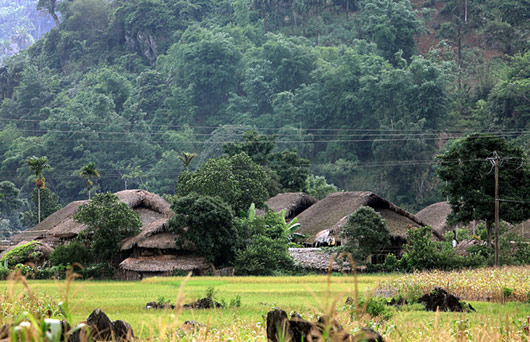Draft Law on Anti-Corruption (amended and supplemented) is currently in the process of collecting feedback, with provisions introducing some new positive content.
Mentioning the corruption situation in Vietnam, everyone feels a sense of anguish. This is not only a problem of one government but also a setback for an entire nation.
Vietnam is listed among countries with the highest inflation rates, only behind Mongolia, the Philippines, Laos, Nepal, Cambodia, and Myanmar. According to the assessment of Transparency International (TI), Vietnam belongs to the group of severely corrupt countries. There were certain advancements in 2011, but Vietnam still scored low and remained at the bottom of the ranking list. TI's evaluation indicates that in Asia, the corruption situation in Vietnam is more severe compared to Singapore, Japan, South Korea, Brunei, Malaysia, China, Thailand, Indonesia...
While the Anti-Corruption Law was first enacted in 2005 and amended twice, in 2007 and 2012, with more than 10 guiding documents, it seems to have yet to achieve its objectives. Is it because corrupt behaviors have become increasingly sophisticated, making the regulations unable to keep up? Or is it fundamentally because the principles on which the laws are based are full of loopholes and lacking mechanisms to ensure enforcement?
Conference for public opinion contribution on the draft law
Recently, the National Assembly issued the draft Anti-Corruption Law (amended and supplemented) consisting of 111 Articles and 10 Chapters (adding 2 chapters compared to the current law).
Chapter I: General Provisions
Chapter II: Prevention of Corruption
Chapter III: Transparency and Control of Assets and Income (New Chapter)
Chapter IV: Detection and Handling of Corruption (Combination of Chapter III and Chapter IV of the current law with amendments and supplements for appropriateness)
Chapter V: Anti-Corruption Agencies and Organizations
Chapter VI: Responsibilities of the Heads of Agencies, Organizations in Anti-Corruption.
Chapter VII: The Role and Responsibilities of Society in Anti-Corruption
Chapter IX: International Cooperation in Anti-Corruption
Chapter X: Implementation Provisions.
New provisions on public disclosure and transparency in anti-corruption:
- Policies, laws, and the implementation of policies and laws, especially content related to the rights, legitimate interests of officials and public employees, and employees.
- Results of operations of agencies, organizations, and units and the arrangement, management, and use of funds from the state budget or from other legitimate mobilized sources.
Newly Established Ad-Hoc Committee.
According to Clause 1 of Article 92 of the Draft,
The National Assembly decides to establish an Ad-Hoc Committee to investigate serious, complex corruption cases of public interest according to the provisions of Articles 88 and 89 of the Law on the Organization of the National Assembly and the proposal of the National Assembly Standing Committee.
Although ensuring the principle of separation and specialization, the establishment of an Ad-Hoc Committee for routine cases must adhere to a prescribed procedure. This could lead to delays in inspection, creating loopholes for subjects under investigation to destroy, falsify evidence, or "meddle" in the establishment of the Ad-Hoc Committee.
 |
|
Illustrative photo of the situation "playing ball and blowing the whistle"
The draft stipulates new responsibilities for the Central Inspection Committee of the Communist Party, accordingly:
The Central Inspection Committee of the Communist Party is responsible for:
- Inspecting, supervising, and disciplining party members who commit acts of corruption according to the Party's regulations, State policies, and laws.
- Managing declarations of assets and incomes, controlling assets and incomes of individuals obligated to declare according to the provisions of Chapter III of this Law, checking cases with signs of corruption as prescribed in Chapter IV of this Law.
- Directing and guiding the provincial and city inspection committees directly under the Central to manage asset and income declarations, control assets and incomes, inspect cases with signs of corruption according to the provisions of Chapter IV of this Law.
- Coordinating with the Government Inspectorate in building, managing, using, and exploiting the National Database on asset and income declarations.
The Government of Vietnam considers “corruption as an invasive enemy,” hence, the anti-corruption fight should be as rigorous as the fight against an external enemy. However, this issue seems to remain theoretical rather than codified. Currently, the process of handling corruption violations is prescribed in the Criminal Procedure Code and handling based on the Criminal Code, making it hard to avoid the phenomenon of “the one playing ball also holding the whistle.” Establishing a separate legal framework, an independent process may be necessary to maximally address corruption. Additionally, criminal handling should go beyond ordinary reasoning, being more arbitrary, and deterrive.
The draft Anti-Corruption Law (amended and supplemented) is currently in the phase of collecting public opinions and is expected to be passed in the XIV session.
 Article table of contents
Article table of contents






.Medium.png)
.Medium.png)
.Medium.png)
.Medium.png)
